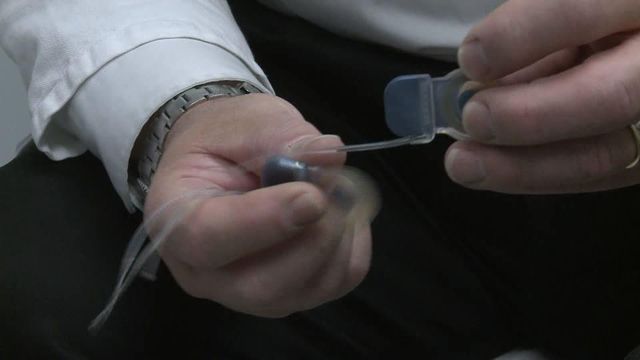UNC procedure gives veteran hearing back
It's an amazing era for many people who suffer from hearing loss. Thanks to ever-improving technology and the use of cochlear implants, devices surgically implanted into the inner ear, people once consigned to reading lips and learning sign language have been given a new lease on life.
Posted — UpdatedThanks to ever-improving technology and the use of cochlear implants, devices surgically implanted into the inner ear, people once consigned to reading lips and learning sign language have been given a new lease on life.
Sixty-one-year-old Archie Zanders, a Vietnam War and Desert Storm veteran, is one of them. Zanders lost his hearing because of the loud explosions of war. Now, thanks to doctors at the University of North Carolina at Chapel Hill Medical Center, he's getting it back.
"I wasn't hearing anything in my left ear, and I had some hearing in my right ear," Zander said.
Zanders tried normal hearing aids, but his problems persisted year after year.
Eventually, hearing aids didn't help. Zanders was missing out on important sounds in his life, including the voices of his young grandchildren.
"I'm not hearing doorbells," he said. "I don't hear telephones ring."
After consulting with doctors at UNC about his problems, Zanders decided to get a cochlear implant.
Last month, Dr. Harold Pillsbury, a surgeon at UNC, implanted the newest, smallest cochlear device in Zander's left ear. It's not visible, but that's the point, Pillsbury says.
Just a few days ago, audiologist Meg Dillon turned on Zander's implant for the first time and adjusted the volume fed through different electrodes stimulating the cochlea.
Doctors and Zander's girlfriend, Deborah Dugeon, watched – and listened – as Zander repeated words that he heard for the first time in years. Dugeon says it's a life-changing moment that will allow Zander to get back to the life he knew before his hearing loss.
"He does a lot of stuff for the church," she said. "One time, he stopped doing stuff because he couldn't hear."
Doctors say Zander is a good candidate to have another implant put behind his right ear because of how well he responded to the first one and his relatively young age. Doctors don't recommend a second implant for older patients because of other health complications.
• Credits
Copyright 2024 by Capitol Broadcasting Company. All rights reserved. This material may not be published, broadcast, rewritten or redistributed.





